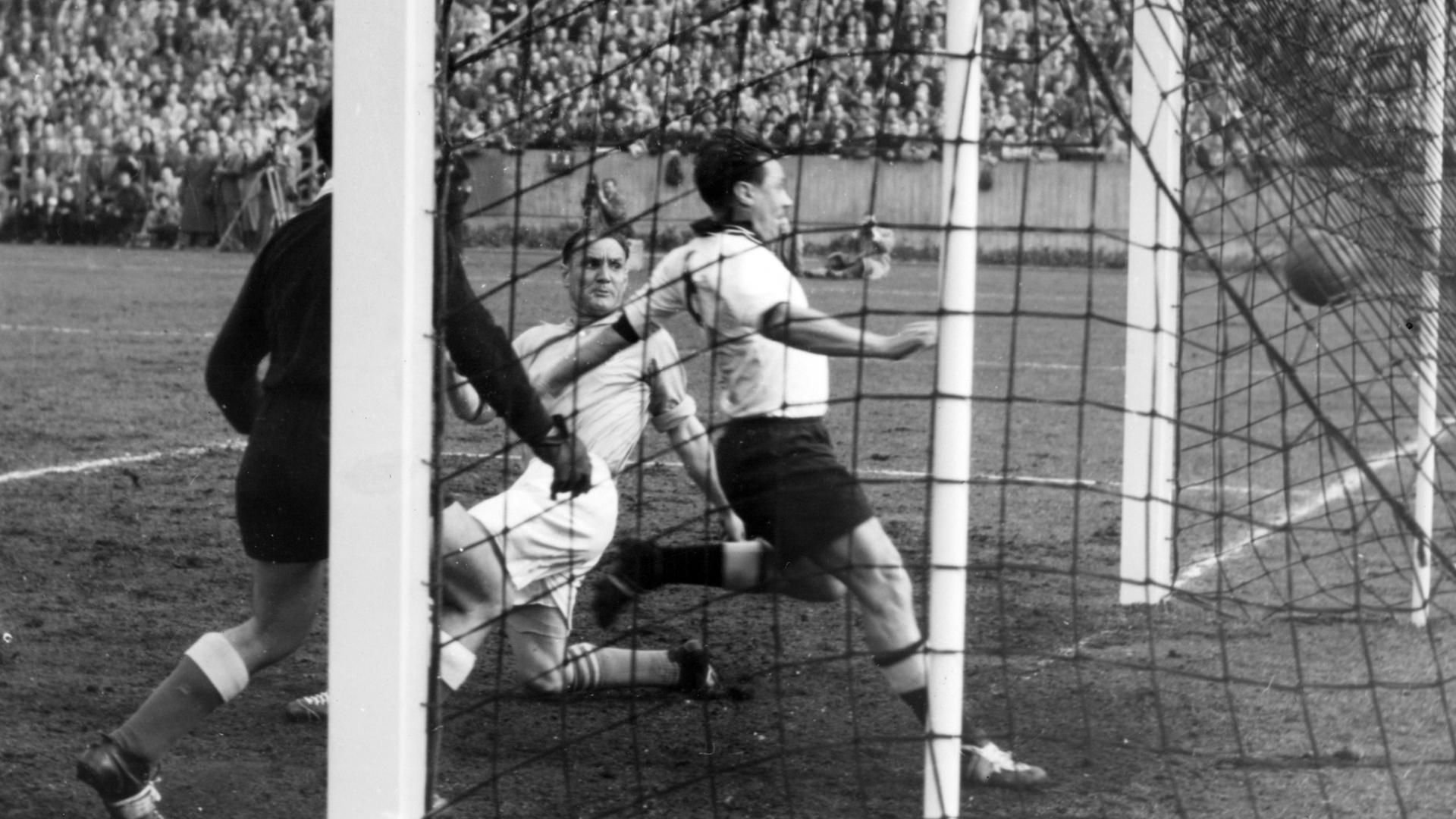Germany defeated the Saarland national football team 3-1 in the World Cup qualifier on March 28, 1954, Max Morlock (r.) scored the first goal for the DFB team. (picture alliance / dpa / dpa)
The Ludwigsparkstadion in Saarbrücken on March 28, 1954. More than 50,000 spectators crowd to the edge of the field. The national team of the Federal Republic needs a win to qualify for the World Cup in Switzerland. But: This game in Saarbrücken is an away game for coach Sepp Herberger’s selection. The host is the Saarland national team.
“That had a very, very important function. And it was also a departure in the truest sense of the word,” says Reinhold Jost, who has been Minister for the Interior, Construction and Sport in Saarland since 2022. For years he has been interested in the history of sports in his homeland, including the important game in 1954, a few years after the war. “Of course this has an incredibly unifying function. You can then forget one thing or another. You can still be happy about the terrible crimes that the Nazis and many Germans committed at the time in the name of Germany. And also develop a certain pride. Without having to be ashamed of it at the same time.”
Saarland joins FIFA before the DFB
But how does this football game come about? After the Second World War, Saarland initially belonged to the French occupation zone. But soon afterwards it received its own constitution and became the autonomous “Saar State”. Saarland gets its own symbolism with a flag, anthem and coat of arms – and a national football team. At that time, the President of the Saarland Football Association was 30-year-old Hermann Neuberger, who decades later would also take over the leadership of the DFB.
The later DFB president Hermann Neuberger, then president of the Saarland Football Association, ensured that Saarland joined FIFA before the DFB in 1950. (picture alliance / SvenSimon / SVEN SIMON)
The journalist Thomas Wollscheid from Saarländischer Rundfunk remembers the year 1950: “Hermann Neuberger really wanted Saarland to be in FIFA before the DFB. And he probably invited people to some kind of banquet on the eve of a FIFA congress. He himself ate sardines because he thought it lowered his alcohol level. But in this conversation with the delegates he persuaded a lot of people to vote for Saarland’s inclusion in FIFA the next day.”
Without anthems and national flags
In 1950, the Saarland Football Association was admitted to FIFA a few weeks before the revitalized DFB. However, the world association wants to prevent two German teams from being represented at the 1954 World Cup. That’s why he’s working to ensure that the German and Saarland teams compete in the same qualifying group – but only one of them can qualify. The first leg between Germany and Saarland will take place in Stuttgart.
“And Adenauer did not allow anthems to be played and flags to be hung, even though Saarland had its own anthem,” recalls Thomas Wollscheid, who made a documentary about the Saarland national team. “And then there was a compromise, which the then DFB president, Peco Bauwens, probably suggested. And that’s what they agreed on: that no national flags would hang, except the Dutch one because of the referee. And the flags that hung were the flags of the German Football Association and the blue and white ones of the Saarland Football Association, but not a national flag.”
The disappointment is limited
The special status of Saarland was controversial at the time. France and Germany want to assert their economic interests in the region. The Federal Republic won the first leg 3-0, but the disappointment of many Saarlanders was limited. Ultimately, they feel connected to Germany because of their shared history and language.
But the second leg in Saarbücken will also become a political issue. The governments demand that Saarland’s independence not be emphasized too much, says Saarland Interior Minister Reinhold Jost: “That’s why there were no anthems at the game on March 28, 1954 in Ludwigspark. From a nearby forest, someone set up a loudspeaker and then played the German national anthem.”
Germany wins the second leg 3-1, qualifies for the World Cup and finally celebrates the “Miracle of Bern”. There as guests in the stands: the Saarland players. Until its annexation to the Federal Republic in 1957, Saarland played 19 games and won at least six.
For Reinhold Jost, football has a symbolic meaning, especially for the origins of the state at the end of the 1950s. “That means that everything was already distributed with a view to federal authorities and corporate headquarters. And then we were an extra wheel on the car. And this pent-up demand has actually not been met to date. Nevertheless, we were self-confident because, even compared to others, we could say: We already had our own National Olympic Committee, we had our own national football team.”
The Olympic flame in a miner’s lamp
Politics and football are now celebrating the 70th anniversary of the second leg with a celebratory film evening. Werner Otto, Saarland’s last living player, is to be honored as honorary captain. But Interior Minister Reinhold Jost looks beyond football: in 1952, Saarland was represented by 36 athletes at the Summer Olympics in Helsinki. Without medals, but with starting help for the hosts.
Jost says: “Without Saarland, for example, the Olympic flame would not have come to Helsinki. It was a Saarland miner’s lamp that made it possible for this flame to be lit in Athens and handed over there and then taken by plane to Norway. And from there to Helsinki.”
Reinhold Jost is in contact with the Finnish Sports Museum. He would like to present the miner’s lamp in Saarland for one or two years. So that the younger generation also learns that Saarland was once at the Olympics. And challenged the eventual world champion in football.
